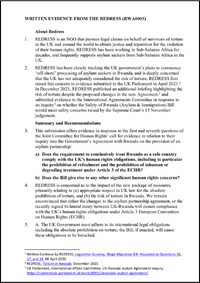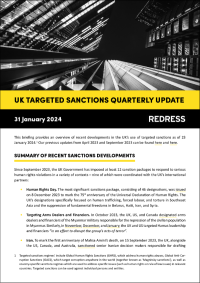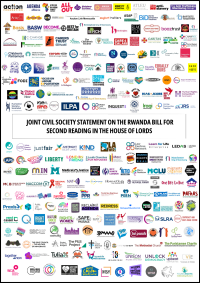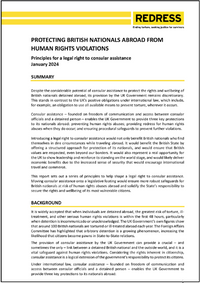Publications
REDRESS’ publications are also available in hard copy format. Please contact us for further information on [email protected].
This Practice Note aims to facilitate the understanding and practice of a survivor-centred approach to strategic human rights litigation and reparation claims. It is based on REDRESS’ experience, desktop research, and consultations carried out with 12 practitioners from international and national organisations with vast experience in supporting survivors in obtaining reparation in different regions. While this Practice Note provides useful guidance based on experience to date, it is important to acknowledge that practices in this area are constantly evolving.
This Practice Note is aimed at facilitating the understanding of reparation and its many facets, principles, and standards. It provides practical and comparative examples related to claiming and accessing reparations in different contexts in a survivor-centred manner, and proposes strategies to overcome obstacles in the journey towards reparation. This Practice Note is complemented by REDRESS Practice Notes on Claiming and Implementing Reparation, Survivors Centred Approach, and Compensation.
REDRESS' submission to the UN Human Rights Committee's review of the UK's compliance with the International Covenant on Civil and Political Rights (ICCPR). The submission focuses on three key issues raised in the UN’s List of Issues prior to the submission of the eighth periodic report. The first addresses the criminalisation of torture, emphasizing the need for universal jurisdiction. The second highlights the UK's involvement in torture and rendition, urging a prompt and impartial investigation into allegations of collusion. The third underscores the importance of non-refoulement, expressing grave concerns about recent legislative developments, particularly the Illegal Migration Act 2023 and the proposed Safety of Rwanda (Asylum and Immigration) Bill.
Evidence submitted by REDRESS to the Joint Committee on Human Rights' Inquiry on the Safety of Rwanda Bill.
This briefing provides an overview of recent developments in the UK’s use of targeted sanctions as of 23 January 2024.
In this joint civil society statement, REDRESS and over 260 other organisations, call on the House of Lords to reject the Rwanda Bill in its second reading.
Despite the considerable potential of consular assistance to protect the rights and wellbeing of British nationals detained abroad, its provision by the UK Government remains discretionary. This report sets out a series of principles to help shape a legal right to consular assistance. Moving consular assistance onto a legislative footing would ensure more robust safeguards for British nationals at risk of human rights abuses abroad and solidify the State’s responsibility to secure the rights and wellbeing of its most vulnerable citizens.
Victims of human rights violations have the right to effective reparations. However, those reparations are not always accessible in practice, leaving victims without redress, while those responsible for the harm inflicted continue to profit from their abuses. This report argues that it is high time for legal and policy reforms to challenge the financial impunity enjoyed by perpetrators, and fund reparations for victims. It identifies important legal and policy reforms that the UK Government should implement to ensure the repurposing of profits derived from violations of human rights and humanitarian law to provide reparations to victims. Innovative avenues are available to produce significant funds that would have a transformative impact on the lives of victims.








